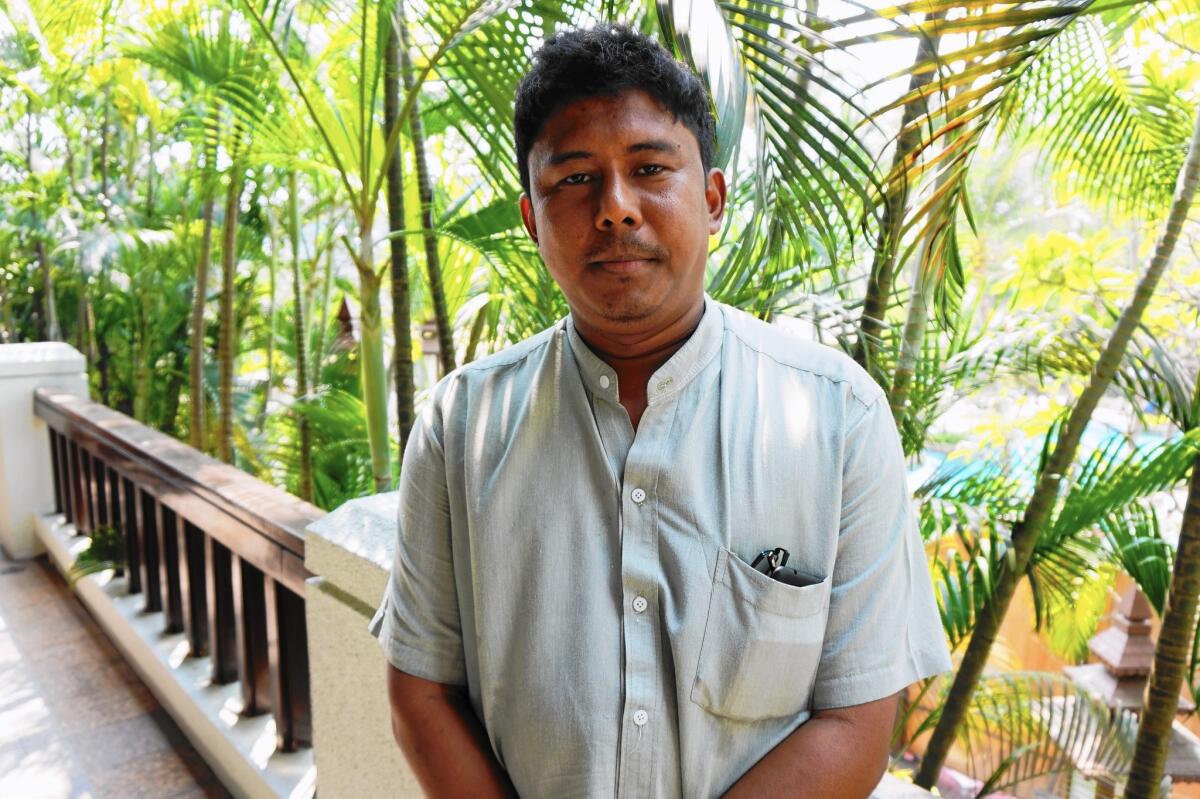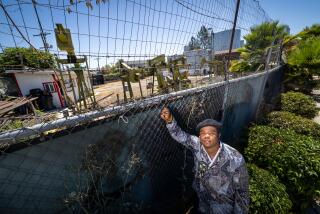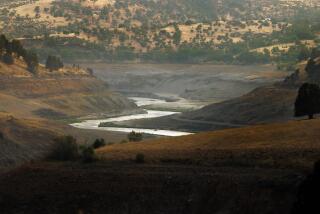Goldman Environmental Prize honors anti-dam campaign in Myanmar

- Share via
Myint Zaw knew his underground campaign against a huge government-backed hydroelectric project was succeeding when he climbed into a taxi late one night and the driver recognized his voice through the shadows.
“You’re the man from the ‘Save the Irrawaddy,’” the driver said, referring to a video in which Myint Zaw and other activists argued that the proposed Chinese-led dam project would damage Myanmar’s most important river.
Even more astonishing — in a country then ruled by a military junta that strictly controlled the flow of information — the cabbie said he had been so moved by the video that he made dozens of copies and handed out the DVDs to passengers.
“A country like us, we have a lot of ethnicities and a lot of issues dividing people, but when we talk about the Irrawaddy, it’s a unifying thing,” Myint Zaw said. “Maybe that made people listen more, and want to participate.”
In 2011, Myanmar’s new government suspended the Myitsone dam project to meet “the wishes of the people.” For a country tentatively emerging from five decades of army rule, and heavily dependent on Chinese investment, it was a remarkable concession to the quiet pressure campaign led in part by Myint Zaw, 40, who on Monday was being named a winner of the annual Goldman Environmental Prize, one of the most prestigious honors for green activists.
A self-taught writer who spent a year at the UC Berkeley School of Journalism, he — and fellow environmentalists — found ways around government censorship through the arts, a sphere where the ruling generals had allowed the people of Myanmar, also known as Burma, a little breathing room.
Political meetings were banned and Internet use restricted. But Myint Zaw, working from a cramped Yangon office that doubled as his apartment, in 2009 began organizing art exhibitions and seminars with prominent writers that focused on the topic of water.
He also enlisted the support of the generals’ most prominent opponent, Aung San Suu Kyi, who made the campaign a theme of her speeches. “Save the Irrawaddy,” a literary event, turned into a forum where experts raised awareness of the threats to the river, the lifeblood of a nation in which 70% of the people are rural farmers.
His campaign is far from over. Myanmar officials have said the decision on whether to resume the Myitsone dam project will rest with the administration that takes power after elections in November, the first nationwide vote since the military rulers ceded some authority to a semi-civilian administration in 2011.
The $3.6-billion undertaking, financed by the state-backed Chinese Power Investment Corp., envisions a 500-foot-tall dam and 3,000-megawatt power plant at the headwaters of the Irrawaddy in northern Myanmar.
About 90% of its electricity would be exported across the border into China’s Yunnan province. Activists fear that would give Beijing near-total control of a waterway that irrigates Myanmar’s rice farms, feeds a large fishing industry and provides silt for the country’s vast southern delta.
State-run Chinese media have published articles calling for the resumption of the project, which is subject to a contract between the two nations whose details have not been made public. For many in Myanmar, however, the dam project was an example of Chinese exploitation of its smaller neighbor — and of development policies by the military leadership that environmentalists say devastated forests and wildlife.
“Because of the lack of transparency in how the project would be operated, there was a very legitimate fear of losing control of this very important river,” said Carl Middleton, a professor of international development studies at Chulalongkorn University in Thailand.
The campaign came as President Thein Sein, a former army general, sought to distance Myanmar’s transitional democracy from the policies of the past.
“Given China’s very close relationship with Myanmar during the military government period, it made it an especially risky project to challenge,” Middleton said. “The suspension of the project was a very significant message that there was a major change happening at the higher levels of government.”
A soft-spoken man with bushy dark hair and oversized eyeglasses often tucked into his shirt pocket, Myint Zaw did not set out to be an activist. Born in Myanmar’s southern delta, where the river splinters into countless streams that meander through rice paddies and thickets of mangroves, he started as a journalist writing on rural issues but found it difficult to get stories past the official censors.
The word “dam” was too sensitive, but words like “reservoir” could be used. Stories about repression in countries such as North Korea were written as parables about Myanmar’s own restrictions.
In 2003, he visited mountainous Chin state in western Myanmar, where acres of forests, the prime source of fuel for residents, had been decimated by unchecked logging. Myint Zaw wrote a feature story about how far people had to walk to find firewood — an oblique reference to the destruction.
After studying in Thailand and at Berkeley, he returned to Myanmar in 2008 to help in the aftermath of Cyclone Nargis, which hammered the delta region and resulted in more than 100,000 deaths. The generals placed strict restrictions on relief efforts, which many experts say worsened the death toll.
Although recent clampdowns on student protests and a military campaign against northern ethnic rebels have raised concerns about Myanmar’s democratic transition, Myint Zaw said the country’s army establishment has learned the power of public opinion.
“The public is now much more motivated and well-informed than in 2011,” he said. “Myitsone will be a hard sell for whoever comes into power, if they want to proceed with it.”
Other Goldman Prize winners being announced Monday include Marilyn Baptiste of Canada, Jean Wiener of Haiti, Phyllis Omido of Kenya, Howard Wood of Scotland and Berta Caceres of Honduras.
More to Read
Sign up for Essential California
The most important California stories and recommendations in your inbox every morning.
You may occasionally receive promotional content from the Los Angeles Times.











